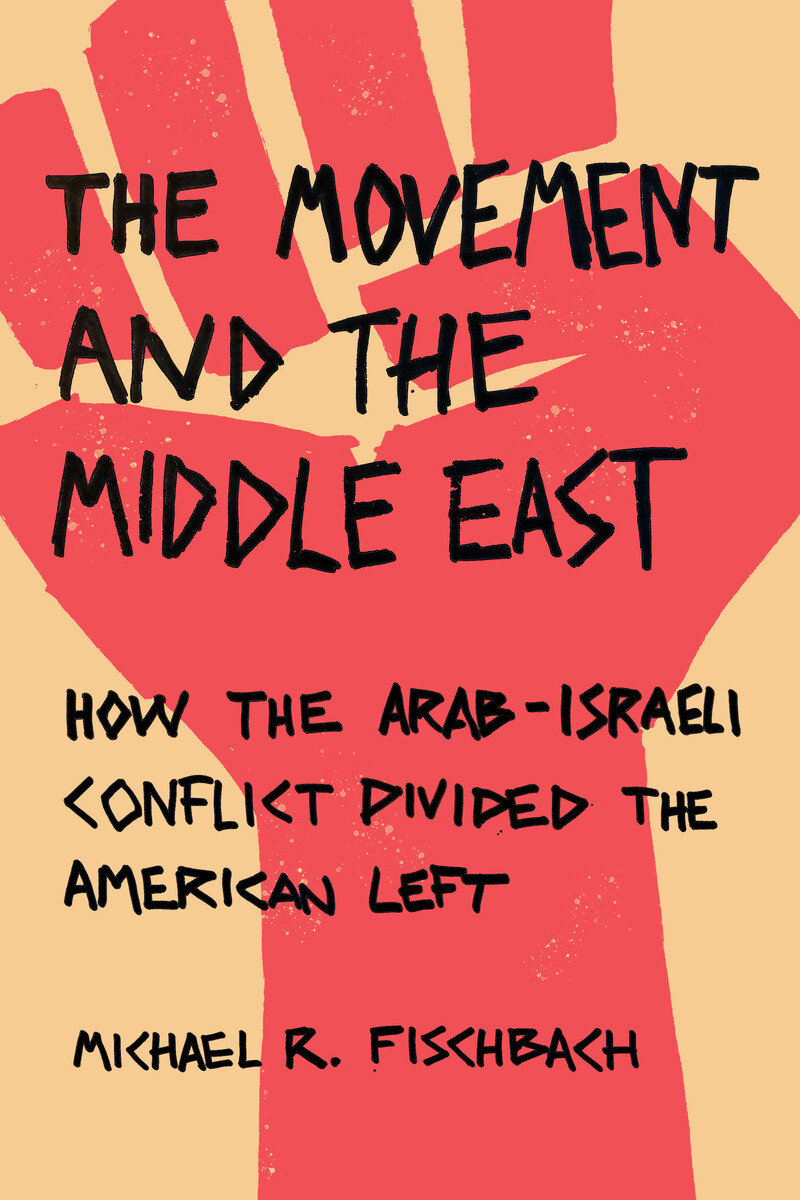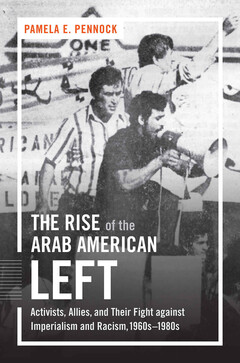The Electronic Intifada 1 April 2020

The Movement and the Middle East: How the Arab-Israeli Conflict Divided the American Left by Michael R. Fischbach, Stanford University Press (2019)
How did discord on Palestine divide and weaken the US left?
Historian Michael R. Fischbach delves deep into this question in his well-documented book that follows the 2018 publication of his groundbreaking study Black Power and Palestine: Transnational Countries of Color.
Numerous studies have examined the New Left of the 1960s. The Movement and the Middle East is the first, according to its author, to focus on how a wide spectrum of the US left responded to the Palestinian liberation struggle.
Fischbach begins with the 1967 War and carries it into the early 1980s. During this period, “The Movement,” which Fischbach defines as “a loosely organized collection of people determined to end the [Vietnam] war and bring radical change to America,” grappled with support for global revolution and opposition to imperialism.
This also entailed confronting what Fischbach terms “Israel exceptionalism,” the idea that due to the history of Jewish persecution, Israel was somehow exempt from standards of international law.
An epilogue draws comparisons between this period and today’s Palestine solidarity movement in the US.
The New Left
The author relies on interviews with some of the principal organizers of the period, as well as primary source material from relatively obscure publications and documents, including records of FBI surveillance and interference.
Fischbach examines the entire spectrum of the US left, distinguishing between the New Left and the Old Left by defining the latter as the remnants of doctrinaire Marxist-Leninist parties with origins in the 1920s and 1930s. By the time of the 1967 War, much of the New Left sided with Israel with only a few dissenting voices.
When the independent radical newsweekly The Guardian, well-read on the Left at the time, editorialized in support of the Palestinians and labeled Israel a colonialist country, the newspaper lost several thousand subscribers.
On college campuses, many students regarded Israel as an underdog David up against reactionary Arab leaders. But within a span of two years, as the Israeli government’s support for the Vietnam War grew noticeable and the New Left evolved its critique of US foreign policy, things began to change radically.
The national leadership of Students for a Democratic Society (SDS), then the largest organization and virtually synonymous with the New Left, began to champion the Palestine liberation struggle.
Fischbach quotes from articles in several issues of SDS’ publication New Left Notes, saying that after Vietnam, Palestine was perhaps “the leading struggle against US imperialism in the world today.”
The articles portrayed Israel as a settler-colonial state that had ethnically cleansed Palestinians in 1948 similar to what befell Native Americans with the arrival of European colonizers to the continent.
That position, however, received pushback within SDS, and it affected the organization’s funding, similar to what happened with the Student Nonviolent Coordinating Committee, as the author documents in Black Power and Palestine.
A form of liberal Zionism began to develop within SDS, which was on the verge of splitting over other issues. Fischbach describes the formation and subsequent positions of several splinter groups and other remnants of SDS that evolved either into Marxist-Leninist-Maoist formations or democratic socialist groups.
At this juncture in his narrative, the author is only beginning to probe the extent of the disputes within the Movement.
Veterans of the Left may find this historical account of interest. But what about today’s young activists for whom it may only resemble an alphabet soup of now-defunct or moribund organizations?
Fortunately, Fischbach’s epilogue helps readers appreciate the relevance of old political disputes as support for Palestinian rights is becoming increasingly mainstream and is even beginning to roil the Democratic Party.
Change
What’s different about then and today? Fischbach notes that early Left debates on Palestine were largely theoretical and involved little practical activity beyond issuing statements of solidarity.
That began to change in the late 1970s and early 1980s when Palestine solidarity organizers started educating civil society, especially traditional peace and civil rights groups, religious groups, trade unions and eventually indigenous rights and immigrant rights groups, as well as reaching out to Arab American and Jewish communities.
Many radical US organizations, however, failed to stay abreast of developments within the Palestine Liberation Organization, Fischbach notes, and seemed unaware that the PLO was abandoning armed struggle and was soon to accept the idea of a two-state solution.
Although Fischbach does not include an account of the Oslo accords in his narrative, the 1993 agreement, along with the end of the Cold War, sapped the urgency of the struggle for many on the US left and led to complacency.
The advent of the Palestinian-led boycott, divestment and sanctions movement in the early 21st century not only aroused new sympathy but also made solidarity activity even more practical and widespread.
Another difference between the two periods is the extent to which the Movement of the 1960s-1970s focused on political economy to situate Israel’s role in the Middle East and explain why the major Western imperialist countries supported it.
Again and again, references to oil as a key Middle East resource appear in newspaper articles and pamphlets of the time with statements such as “the real reason for the June [1967] War was the multibillion-dollar profits of American oil companies.”
Such analyses appear rarely today due to a fundamentally new strategy of focusing on international law and the denial of basic human rights to Palestinians. An exclusive focus on the role of the Israel lobby also tends to obscure the material interests of the military-industrial complex and the geopolitical interests of the US national security establishment.
However, the role of the Israeli government and its lobby in encouraging US intervention today in Iran, Iraq and Syria renews the spotlight on the Middle East’s oil resources. It explains why Israel is useful to Western imperialism as a regional hegemon and why Palestinian rights can, therefore, be sacrificed for the sake of a strategic ally.
Progressive defenders of apartheid
Hitting the refresh button on this analysis also comes as the climate change movement is demanding that fossil fuels remain in the ground. Military interventions that involve controlling access to oil only increase the likelihood of ecological collapse.
The similarities between then and now are also striking. The debates over the nature of Zionism continue as Jewish Voice for Peace renounces the ideology while J Street and other liberal groups seek to preserve Israel as a Jewish state.
Identity politics, which Fischbach describes in a separate chapter on divisions within the feminist movement over Palestine, still play out today with efforts to censor and oust pro-Palestinian feminist leaders such as Linda Sarsour and Angela Davis. And all too often, then as today, the Palestine solidarity movement tends to privilege Jewish or Jewish-Israeli voices over those of Palestinians.
Fischbach concludes with a relatively balanced assessment, noting the gains that have been made over the intervening years but warning that those who believe in “Israel exceptionalism” continue to have considerable political influence on the Left, as evidenced by the current presidential contest.
“Making common cause with pro-Palestinian activists in any type of anti-Trump coalition,” he observes, “may be exceedingly difficult for strongly pro-Israeli progressives.”
And therein lies the problem: Those who defend a system of apartheid still receive the “progressive” label.
Rod Such is a former editor for World Book and Encarta encyclopedias and was a New Left activist on the staff of The Guardian, an independent radical newsweekly, from 1969-1975. He lives in Portland, Oregon, and is active with the Occupation-Free Portland campaign.






Comments
Progressive
Permalink Ernesto Che replied on
"Those who defend a system of apartheid still receive the “progressive” label."
Yes, and there is also the "liberal Zionist" label, which is a contradiction in terms. Zionism, by definition, is a racist political ideology, and cannot therefore be liberal, by definition. There is no such concept as liberal racism.
courageous journalism
Permalink Eric replied on
Decline and closure of The Guardian (New York, not Manchester/London) was a great blow to the left.
Does any current publication or website have its depth, breadth and progressive clarity?
The "US Left"?
Permalink joe replied on
"How the US left..."
Let's not be ridiculous. There's no such thing.
Progressives are not the Left.
Permalink Remy replied on
The progressive label has become worthless in US. They are co-opted by the pit of corruption that is the Democratic Party, today. Party 'progressives' mind their own best interests. In international matters, they vote with the Party bosses if they hope to see campaign funding. After they take their all-expense-paid trip to Israel, they steer clear of foreign affairs.
The authentic Left in the US, has never had a voice or a party. The Left stands with the vast silent majority who are not affiliated with either disgraced political party. If a Worker's Party or a People's Party is ever formed in the US, the Left will be there.
US left
Permalink Stephen Shenfield replied on
I must take issue with the statement that the authentic Left in the US has never had a voice or a party. In the decades preceding World War I Debs' Socialist Party of America, the Industrial Workers of the World (IWW or 'Wobblies'), and the populist movement, were all significant forces and 'authentically left.' This left was destroyed mainly by waves of repression during and in the aftermath of World War I and again in the 1950s with McCarthyism (which is not to deny that the destruction was partly self-inflicted). It is important to preserve the memory of those times because they give the lie to the ruling class myths that there is something in the American culture or way of life that is inherently incompatible with a strong Left and that Left ideas and values are foreign imports. What existed then can exist again.